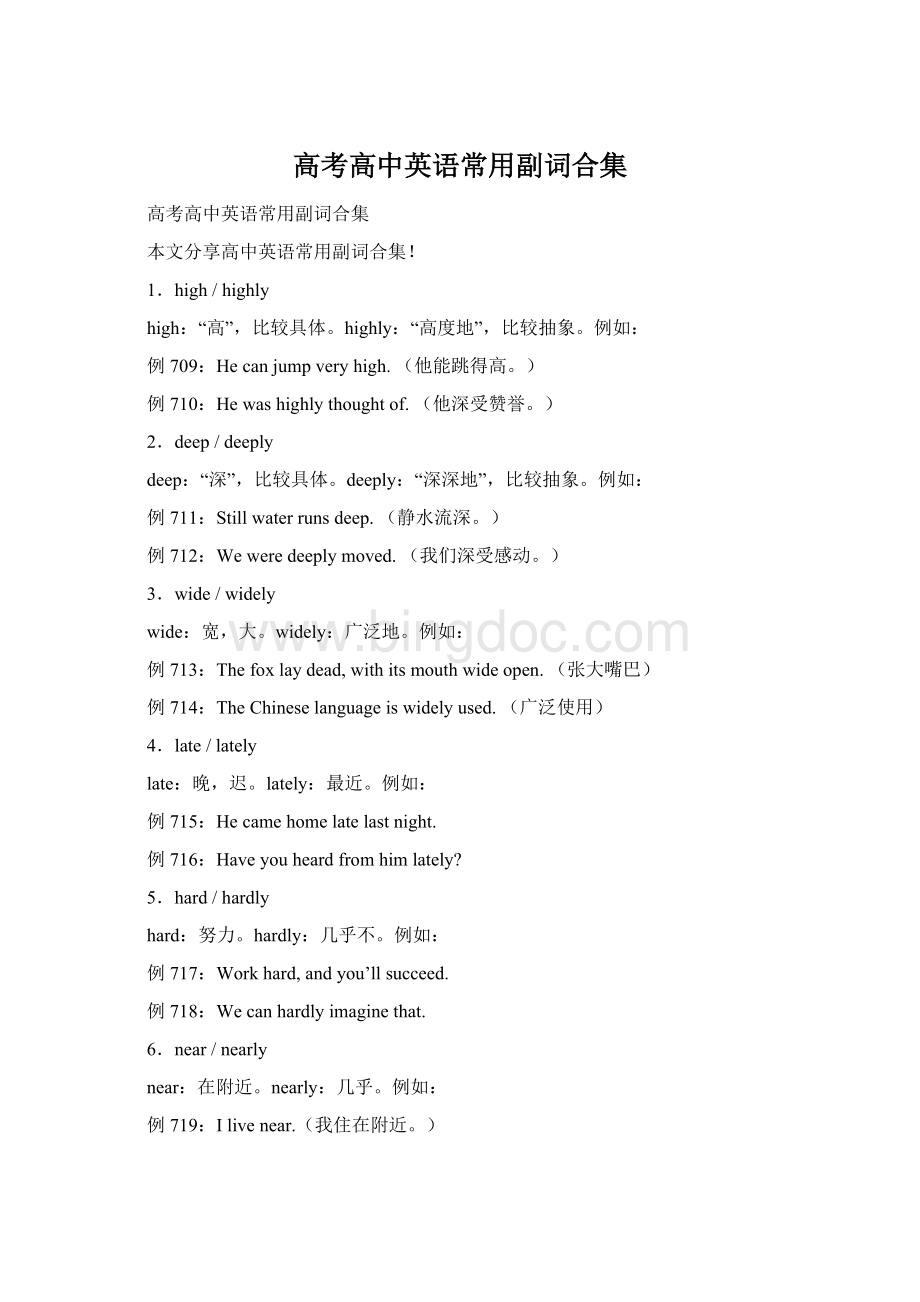高考高中英语常用副词合集.docx
《高考高中英语常用副词合集.docx》由会员分享,可在线阅读,更多相关《高考高中英语常用副词合集.docx(7页珍藏版)》请在冰点文库上搜索。

高考高中英语常用副词合集
高考高中英语常用副词合集
本文分享高中英语常用副词合集!
1.high/highly
high:
“高”,比较具体。
highly:
“高度地”,比较抽象。
例如:
例709:
Hecanjumpveryhigh.(他能跳得高。
)
例710:
Hewashighlythoughtof.(他深受赞誉。
)
2.deep/deeply
deep:
“深”,比较具体。
deeply:
“深深地”,比较抽象。
例如:
例711:
Stillwaterrunsdeep.(静水流深。
)
例712:
Weweredeeplymoved.(我们深受感动。
)
3.wide/widely
wide:
宽,大。
widely:
广泛地。
例如:
例713:
Thefoxlaydead,withitsmouthwideopen.(张大嘴巴)
例714:
TheChineselanguageiswidelyused.(广泛使用)
4.late/lately
late:
晚,迟。
lately:
最近。
例如:
例715:
Hecamehomelatelastnight.
例716:
Haveyouheardfromhimlately?
5.hard/hardly
hard:
努力。
hardly:
几乎不。
例如:
例717:
Workhard,andyou’llsucceed.
例718:
Wecanhardlyimaginethat.
6.near/nearly
near:
在附近。
nearly:
几乎。
例如:
例719:
Ilivenear.(我住在附近。
)
例720:
Nearly1,000peopleweretrappedinthefire.(将近有一千人被困大火中。
)
7.close/closely
close:
靠近。
closely:
紧紧地,密切地。
例如:
例721:
Comeclosetome.(请靠近我。
)
例722:
Watchhimclosely.(请密切关注他。
)
8.free/freely
free:
免费,自由地。
freely:
自如地。
例如:
例723:
TheshowwasarrangedtoadmitfreethestudentsfromSeniorIII.
(安排高三学生入内免费参观展览。
)
例724:
Hecancommunicatefreelywiththenativespeakers.(他能与当地人自如交谈。
)
9.most/mostly
most:
最,相当。
mostly:
大多数。
例如:
例725:
LessonOneisamostdifficultlesson.(第一课很难。
)比较:
例726:
Theyaremostlyvisitingscientists.(他们大多是来访的科学家。
)
10.just/justly
just:
刚刚,仅仅,正好。
justly:
公正地。
例如:
例727:
I’vejustarrived.
例728:
Iwanttobetreatedjustly.(我需要公正对待。
)
11.alittle/abit
用作副词词组时,alittle和abit都有“一点儿”的意思,都可以直接修饰形容词或副词。
用作形容词词组时,alittle可以直接修饰不可数名词,abit则必须先加介词of,再加不可数名词;notalittle与notabit的意思相反,前者是“非常”的意思,后者则是“一点儿也不”的意思,分别相当于verymuch和notatall。
例如:
例729:
I’mfeelingalittle/abitnervous.
例730:
Thereisstillalittle/abitofwaterleftinthejar.(形容词性)
例731:
—Areyoufeelinghungry?
(饿吗?
)
—Notabit,forI’vejusthadarichmeal.(不饿,刚吃过大餐。
)
—Notalittle,it’shightimewehadlunch.(很饿,早该吃午餐了。
)
例732:
Hewasnotalittletired,sohefellasleepthemomenthisheadtouchedthepillow.
(他很累,所以一躺下就睡着了。
)
例733:
Afterclimbingthemountain,hewasalittle/abitthirsty,butnotabittired.
(爬山后,他有点渴,但一点也不累。
)
12.ago/before
ago:
在……以前。
指从此刻起若干时间以前,通常与过去时态连用。
例如:
例734:
Ithappenedtwodaysago.
before:
在……以前。
指从那时起若干时间以前,通常与过去完成时态连用。
例如:
例735:
Hesaidthathehadseenhertwodaysbefore.
此外,before也可以泛指以前,与完成时态或过去时态连用。
例如:
例736:
I’veneverheardofsuchamanbefore.
例737:
Imethimsomewherebefore.
13.almost/nearly
almost:
差不多,几乎。
有verynearly的意义。
例如:
例738:
Hehasalmostfinishedhiswork.
例739:
Almostnoonetookanyrest.
nearly:
几乎,将近。
所指的差距一般比almost大。
例如:
例740:
It’snearlyfiveo’clock.
注:
almost有时可与nearly通用,但almost后可接no,none,nothing,nobody等不定代词,而nearly前则可用not。
14.aloud/loud/loudly
aloud:
出声地(有使能听得到的意味);高声地(有使远处能听得到的意味)。
例如:
例741:
Pleasereadthestoryaloud.
例742:
Theywereshoutingaloud.
loud:
高声地,大声地,响亮地。
常指在说笑等方面。
例如:
例743:
Hewasgivinghislectureloudenough.
例744:
Speaklouder.
loudly:
高声地。
有时可与loud通用,但含有喧闹的意味。
例如:
例745:
Someoneknockedloudlyatthedoor.
例746:
Icanhardlyhear;theyaretalkingloudly.
15.altogether/alltogether
altogether:
总共(相当于inall)。
alltogether:
一起(比together语气强,相当于completelytogether)。
例如:
例747:
Altogethertherearesixty-sixofushere.Nowlet’sgo(all)together.
16.always/often/frequently/usually
always:
永远,总是。
与进行式连用时,表示“再三地、老是”等意思,有时表示生气或不耐烦等感情色彩。
例如:
例748:
Thesunalwaysrisesintheeast.
例749:
Theboyisalwaystalkinginclass.(这孩子老在课堂讲话!
)
often:
时常,常常。
强调经常性。
例如:
例750:
Heoftencomesheretoseeme.
例751:
Doyouoftengotothelibrary?
frequently:
时常,屡次。
与often通用,但是强调次数频繁,相当于veryoften。
例如:
例752:
BusinessfrequentlybringshimtoShanghai.(因商务,他常到上海来。
)
例753:
Hefrequentlycomesheretoseeher.
usually:
通常,往常。
强调习惯性。
例如:
例754:
Heusuallycomeshereatseveno’clock.
17.beforelong/longbefore
beforelong:
很快,不久。
可用于各种时态。
例如:
例755:
Beforelonghehadtomoveonagain.
例756:
IthinkI’llmeethimbeforelong.
longbefore:
很久以前,老早。
可单独使用,也可带从句。
例如:
例757:
Hesaidhehadseenthefilmlongbefore.(他说他早看过这部电影。
)
例758:
Ihadseenthefilmlongbeforehesawit.(在他看这部电影之前,我早就看过。
)
注意,以下的longbefore在意义上是分开的:
例759:
Itwon’tbelongbeforewemeetagain.(我们不久还会见面。
)
例760:
Itwasnotlongbeforehereturnedtohismotherland.(不久他回到祖国。
)
18.late/later/latest/lately/last/latter
late:
晚,迟。
later:
以后,后来(与late的比较级同形)。
latest:
最新的。
lately:
最近。
last:
上一次,最末了。
latter:
后者。
例如:
例761:
—HaveyouheardfromJacklately?
—Yes,hewenttoJamestownonbusinesslastweek.Onenighthereturnedtohishotellate,andmetwitharobberinthestreet.Hefoughtbravely.Later,thepolicecameandthelatterwasseized.
—Well,thisisthelatestnewsforme!
19.nolonger/nomore
nolonger:
不再,已不。
侧重于时间关系,相当于notanylonger,当状语。
例如:
例762:
TheGreensnolongerliveshere.
nomore:
不再,再也不。
侧重于数量关系;当状语时,相当于notanymore,还可以当定语。
例如:
例763:
Sincewe’vegotnomorechances,we’llnotgothereanymore.
(既然我们不再有机会,我们就不再去那里了。
)
20.still/yet
still:
仍然,还。
表示某事仍在继续之中,多用于肯定句中,常与一般时态、进行时态或完成时态连用;在修饰比较级或加强语气时,可放在被修饰词的前面或后面,此时是“更加”的意思。
例如:
例764:
Justatthatmoment,hewokeup,stillshakingfromtheterribledream.
例765:
Itwascoldyesterday,buttodayitisstillcolder/colderstill.
(昨天很冷,但是今天更冷。
)
例766:
Aftertwohoursthedogwasstillthere.
例767:
Theplanestillhasnottakenoff.(飞机还没起飞。
)
例768:
Tom’sbrothersufferedastillworsefate.(汤姆的兄弟命运更糟。
)
yet:
仍然,还(强调某事尚未完成,但不一定要继续,多用于疑问句和否定句中);然而。
例如:
例769:
Mytaskisnotyetfinished.
例770:
Thoughheisoversixty,yetheisstrong.
21.too/also/aswell/either
too:
也。
通常用于肯定句中;常放在句末,但有时为了不引起含糊不清的感觉,把它紧放在所修饰的词之后。
例如:
例771:
Motherwasangrytoo.
例772:
I,too,havebeentoParis.(这里明确表示人家去过巴黎,我也去过。
而不是我除了去过某地以外,还去过巴黎。
)
also:
也。
通常用于肯定句中;一般靠近动词。
例如:
例773:
Healsoaskedtogo.
aswell:
也。
通常用于肯定句中;常放在句末,除了在may/mightaswell搭配中。
如:
例774:
HeknowsEnglish,andJapaneseaswell.
例775:
Youmightaswelltakeataxi,ifnobusforyou.(如果没有公交车,你也可以打的。
)
either:
也。
通常用于否定句中,而且要放在句末。
例如:
例776:
Ifyoudonotgo,Ishallnoteither.
22.toomuch/muchtoo
toomuch:
太多(后接不可数名词);太过分(后接for短语)。
例777:
Thereistoomuchworktoday.
例778:
Theproblemistoomuchforthefive-year-oldboy.
muchtoo:
太。
比too语气强,相当于fartoo,rathertoo等;其后接形容词和副词。
例如:
例779:
Theproblemismuchtoodifficultforthefive-year-oldboy.
23.very/quite/fairly/rather
very,quite,fairly和rather都有“十分”的意思。
rather可用于修饰形容词或副词比较级,也可放在too(太)之前,very,quite和fairly则不可以。
另外,very通常不修饰以a字母开头的形容词(如afraid,alone,asleep,aware,ashamed等,而要用much修饰),也不直接修饰动词;quite侧重于“完全地、彻底地”,相当于completely或entirely,可修饰形容词、副词或动词;fairly侧重于“还算”,通常修饰“使人感到愉快的”形容词或副词;rather侧重于“极,相当”,通常修饰表示“使人感到不愉快的”的形容词或副词。
例如:
例780:
—Insteadofusing“IverylikeEnglish”,weoftenexpress“IlikeEnglishverymuch.”
(我们不说“IverylikeEnglish.”,通常说“IlikeEnglishverymuch.”。
)
—Quiteright.It’sveryimportant.(完全正确。
这一点很重要。
)
例781:
—Hispronunciationisfairlygood,buthishandwritingisratherpoor.
—Iquiteagreewithyou.